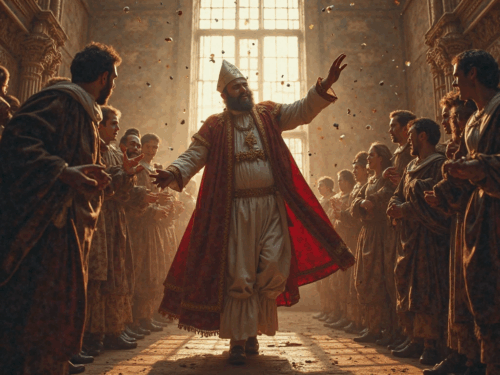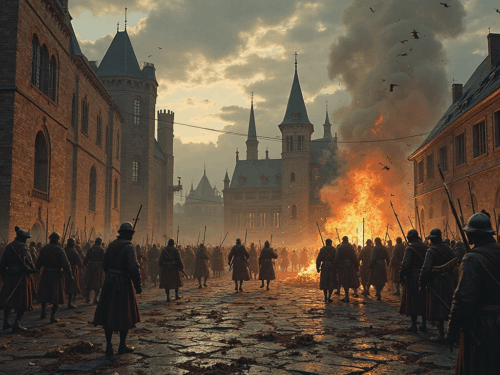History is full of dramatic turning points that continue to influence our lives today—even if they happened centuries ago. One such dramatic event is the Third Defenestration of Prague, which unfolded on May 23, 1618. In an act that seems almost surreal by modern standards, several Catholic regents were thrown from a castle window in Prague. This single, impulsive act set off a chain reaction that ultimately ignited the Thirty Years’ War, forever altering the course of European history. Today, we can look back at that moment not only in awe of its historical significance but also to learn valuable lessons about decisiveness, self-reflection, and the power of our choices.
In this blog, we travel back over four centuries to explore the milieu that gave birth to this dramatic act. We will examine the political, religious, and cultural tensions of the time, delve into the intense personal and collective emotions that fueled the moment, and draw parallels between the historical events and our everyday lives. By understanding the forces at play during the defenestration, we gain insights into how decisive moments—whether on a grand scale or within our personal experiences—can serve as catalysts for transformational change.
—
## The Historical Context: A Powder Keg Ready to Explode
To truly appreciate the magnitude of the Third Defenestration of Prague, it is essential to step into the turbulent world of early 17th-century Central Europe. At that time, the lands that now form modern-day Czech Republic and its surroundings were a patchwork of religious convictions, political allegiances, and cultural identities. Tensions between Catholics and Protestants were at an all-time high, with distrust simmering beneath the surface of everyday life. Bohemia, a vibrant region with a rich intellectual and cultural tradition, was at the epicenter of these religious and political conflicts.
Within this volatile environment, the local Protestant nobility chafed under what they perceived as the heavy-handed and oppressive rule of the Catholic regents appointed by the Habsburg monarchy. The regents not only represented a religious and political ideology but also the distant, monolithic expression of imperial authority that many in the region found stifling. The Bohemian estates—composed of influential aristocrats and emerging civic leaders—had long been in pursuit of both religious freedom and political autonomy. Their simmering frustrations were fueled by a sense of cultural marginalization and the desire for self-determination.
Into this cauldron of conflicting loyalties and passions, a seemingly small spark of rebellion would soon be introduced. On May 23, 1618, in a moment of raw emotion and defiance, a group of Protestant nobles met with regents in Prague Castle. What transpired in that tense meeting was nothing short of extraordinary. In a dramatic act, these determined individuals, citing the violation of their rights and freedoms, violently ejected the imperial officials from a high window of the castle. Although the fall did not result in immediate death due to the circumstances that cushioned their descent, the act itself was an explosive symbol of rebellion. It was as if the very window—an everyday architectural feature—transformed into a portal through which centuries of pent-up frustration and desire for change were irrevocably set in motion.
That single act of defiance did more than merely dislodge a few men from the safety of their chambers. It shattered an old order and propelled the region into a conflict that would engulf much of Europe for decades. The ensuing Thirty Years’ War was one of the longest and most devastating conflicts in European history, redrawing political boundaries, destabilizing economies, and altering the balance of power on the continent. The Defenestration of Prague, while violent and chaotic, became a historic turning point—an emblem of how a moment of passionate protest can unravel longstanding paradigms and lead to widespread transformation.
—
## The Defenestration as a Catalyst for Transformation
The Third Defenestration of Prague was not an isolated moment of impulsive anger; it was a statement—a literal and metaphorical rejection of oppressive forces. It encapsulated the belief that drastic times call for drastic measures. In the charged atmosphere of early 17th-century Bohemia, many felt that incremental change was no longer an option. The act of throwing the regents out of the window symbolized a break from subjugation, a rejection of imposed authority, and a desperate cry for the recognition of rights and freedoms.
This dramatic event carries with it an inherent complexity that continues to fascinate historians and students of human nature alike. On one hand, the act was reckless—a dangerous outburst driven by intense emotions that had long been brewing beneath the surface. On the other hand, it represented a bold declaration of autonomy, a refusal to be bound by the dictates of an external power that many saw as indifferent to their plight. The paradox of the defenestration lies in its simultaneous portrayal of uncontrolled impulsiveness and calculated rebellion. While the immediate outcomes were marked by chaos and ensuing conflict, the long-term effects ultimately led to significant political, religious, and social transformations throughout Central Europe.
In a broader sense, the Defenestration of Prague reminds us of the monumental impact that a single decision can have. The incident illustrates the idea that even the most seemingly spontaneous actions can lead to profound and irreversible consequences. Leaders and common citizens alike have, at different times, faced moments where the pressure to act decisively has outweighed the need to deliberate. Sometimes, these moments of crisis create ripples that reconfigure the fabric of society, just as the defiant ejection from a window precipitated a war that reshaped an entire continent.
The echo of that day—where a window served as the stage for a transformative act—speaks to the inherent unpredictability of human behavior. It offers a stark reminder that every choice, especially those made in the heat of the moment, carries the potential to alter the course of history. And while such dramatic acts are rarely advisable in our daily lives, the underlying message about the weight of our decisions remains timeless.
—
## Personal Reflections: The Modern Individual’s Window
What lessons can a modern individual glean from an event as tumultuous as the Third Defenestration of Prague? At first glance, the connection might seem remote; one might wonder how an incident from over 400 years ago could possibly inform a single person’s journey through life in the 21st century. However, when we peel back the layers of history, we uncover universal truths about human nature, decision-making, and the profound impact of our actions—truths that remain strikingly relevant regardless of the era.
Every day, we are faced with decisions that, although not as dramatic as hurling someone out of a window, can nonetheless set the trajectory for our personal and professional lives. Imagine, for instance, a moment at work when a challenging project pushes you to the edge, demanding an instant decision that will either propel your career forward or have unforeseen negative consequences. Like the nobles in Prague, you are operating under immense pressure, driven by instinct and emotion. The lesson here is not to advocate for impulsive behavior, but rather to appreciate the magnitude of our choices. In the midst of personal conflict, a heated argument, or a moment of intense stress, it can sometimes feel as if options are limited and drastic action is the only way to express our inner convictions. Yet history warns us of the potential fallout of unbridled impulsivity. The defenestration reminds us that while decisive action is sometimes necessary, it must be tempered with reflection, strategy, and an awareness of the long-term consequences.
Consider the realm of personal relationships. Conflicts with friends or family members can escalate quickly, with each heated word carrying the potential to irreparably harm bonds that have taken years to build. The story of Prague teaches us that while emotions may run high and the temptation to act out in immediate retaliation can be strong, achieving meaningful resolution often requires a measured response. Instead of metaphorically “throwing someone out of your life” in an impulsive moment of anger, taking the time to step back, evaluate the situation, and engage in calm dialogue can transform a potential crisis into an opportunity for growth and reconciliation. In this light, the chaotic energy of a defenestration becomes a powerful metaphor: rather than allowing our emotions to dictate a rash course of action, we have the capacity to channel that energy into constructive change that benefits everyone involved.
Moving into the professional sphere, the idea of “defenestration” can serve as a powerful metaphor for shedding outdated ideas and practices. In today’s rapidly evolving world, the ability to adapt and innovate is paramount. Many of us find ourselves stuck in routines or perspectives that no longer serve our best interests. Just as the nobles in Prague boldly discarded an old regime in favor of something uncertain and new, we too can learn to let go of limiting beliefs or practices that hinder our growth. For example, an entrepreneur struggling with a stagnant business model might recall that transformative change often requires disrupting the status quo. The willingness to abandon conventional approaches in favor of innovative strategies can lead to breakthroughs that propel not just a business, but an entire industry, into the future.
On a more personal level, the defenestration offers insight into the nature of risk and the balance between courage and caution. Life is filled with moments where the familiar is comfortable and change is intimidating. Yet, some of the most rewarding experiences come from stepping out of one’s comfort zone—taking a leap of faith that, while risky, holds the promise of growth and renewal. Here, the window in Prague serves as a potent symbol. It reminds us that while looking out into the unknown might be daunting, sometimes the act of venturing into new territories is necessary for personal transformation. The key is to do so with a clear mind, an understanding of potential outcomes, and an unwavering commitment to learning from both successes and failures. This mindset can empower anyone seeking to reinvent themselves, take on new challenges, or simply embrace change with open arms.
Furthermore, the event highlights the value of collective action and the impact of shared beliefs. The Third Defenestration was not the act of a lone individual—it was a collective cry for justice and autonomy, fueled by shared frustrations and common ideals. In our modern era, where communities and networks are more connected than ever, drawing strength from collective wisdom can be transformative. Whether it’s joining professional groups, engaging in community activism, or collaborating with others in personal projects, the knowledge that you are not alone in your pursuit of change can inspire bold initiatives and foster a supportive environment for growth. The defenestration teaches us that when we unite around common values and work together towards a common goal, the impact can be nothing short of revolutionary.
Finally, the story of that fateful day in 1618 serves as a reminder of the importance of perspective. It challenges us to consider how our small decisions, made in moments of intense emotion or uncertainty, might ripple outward in ways we cannot immediately predict. By cultivating mindfulness and a deeper understanding of our motivations, we stand a better chance of aligning our actions with our long-term goals. It is a call to balance passion with prudence, impulsivity with insight. In doing so, we can transform moments of potential crisis into opportunities for meaningful progress, both within ourselves and in the world around us.
In reflecting on this historical episode, one might ask: How can I, as an individual, turn a moment of potential crisis or transition into a turning point for positive change? The answer lies in a blend of courage, thoughtful reflection, and a willingness to embrace the unknown. Whether it’s making a significant career move, resolving a long-standing conflict, or reinventing personal habits, each decision carries the weight of history—reminding us that our actions today can shape the future in profound ways.
—
## Embracing the Past to Illuminate Our Future
The Third Defenestration of Prague stands as one of history’s most vivid examples of how a single, dramatic act can unsettle an established order and forge a path toward transformation. While the event itself was steeped in the chaotic passions of its time, its reverberations echo across the centuries, urging each of us to consider the power and responsibility inherent in our own decisions. We are all, in a sense, living in a period of our personal histories where the choice between inaction and transformative action can have lasting consequences.
Today’s world is filled with challenges that call for both decisive action and reflective consideration. Whether confronting injustice, navigating personal crises, or seeking to innovate in a field that feels stagnant, we must remain mindful of the lessons history offers. The defenestration reminds us that meaningful change rarely comes through cautious acquiescence; it often requires the courage to act, even when the outcome is uncertain. Yet, it also warns us of the risks of unbridled impulsiveness—demonstrating that the fire of rebellion, when not carefully managed, can quickly spiral into chaos.
For the modern individual, the lesson is clear: every moment is an opportunity to redefine the path ahead. Like the window from which those men were forcefully expelled, every decision we make can serve as a threshold—a point of departure from an old way of being into a new chapter filled with possibility. Embracing this mindset encourages us to take calculated risks, to step boldly into new experiences, and to do so with both passion and prudence.
To harness the lessons of this historical moment for personal benefit, one might begin by cultivating awareness of one’s own emotional triggers. When faced with adversity or pressure, allow yourself a moment to consider the possible long-term consequences of your actions. Engage in practices that foster mindfulness—be it through meditation, reflection, or simply pausing to consult with trusted friends or mentors. In doing so, you transform impulsive reactions into deliberate choices that serve your highest aspirations.
Consider, for example, a time when career frustrations or personal setbacks tempted you to take drastic measures—perhaps leaving a job in a sudden, unplanned fashion, or ending a valued relationship over a moment of intense anger. Reflecting on the events of Prague, you might ask yourself: Was this decision driven solely by a surge of emotion? Could a slightly altered approach have led to a more constructive outcome? Such introspection not only enhances self-awareness but also builds the resilience needed to navigate the complexities of modern life.
Moreover, the event serves as an inspiring illustration of the transformative power of collective action. In our interconnected age, forming supportive communities where shared values and mutual trust thrive is more important than ever. Whether through local activism, professional networks, or online communities, leveraging collective wisdom can help us overcome obstacles and achieve breakthroughs that might seem insurmountable when faced alone. Embracing the spirit of unity and collaboration encourages progress that is both innovative and sustainable.
In practical terms, this might mean organizing regular discussions with peers about challenges and potential innovations in your field, or joining groups that encourage personal and professional development. By doing so, you create an environment where big ideas are nurtured and bold decisions are made not in isolation but with the backing of a community that believes in shared success. This collaborative approach can be the difference between a momentary setback and the beginning of a remarkable journey toward growth and fulfillment.
Ultimately, the Third Defenestration of Prague is a call to action—a reminder that history is not merely a collection of distant events, but a source of timeless wisdom. Every day, we stand before our own proverbial windows, facing opportunities to let go of outdated methods, harmful habits, or restrictive patterns of thought. The courage to leap into the unknown, tempered by a mindful appreciation of the potential fallout, can lead us to surprising and rewarding horizons.
Embracing this narrative in your personal life means recognizing that while the impulse for change may be powerful, the way we channel that impulse defines our future. It is a testament to the delicate balance between passion and prudence, between the drive to dismantle what no longer serves us and the wisdom to build something new and enduring. By internalizing these lessons, you not only honor the turbulent legacy of events like the defenestration but also empower yourself to craft a life of intentional, transformative progress.
As you continue on your journey, remember that every decision—no matter how small it may seem—has the potential to alter the course of your personal history. Seize the lessons of the past, learn from the cautionary tales woven into our collective memory, and step forward with a resolve to act boldly yet thoughtfully. In doing so, you create a legacy built on deliberate action, resilient growth, and the unwavering belief that even in the most turbulent moments, there lies the seed of transformation.
Let the story of the Third Defenestration of Prague inspire you to look at your own life with new eyes. When challenges arise, ask yourself if you are ready to break free from constraints that limit your potential—or if you might instead channel your energy into positive, impactful action that propels you toward your dreams. By embracing this balance, you not only honor the spirit of historic transformation but also pave the way for a future defined by both innovation and integrity.
In conclusion, history is a vast reservoir of metaphor and meaning. The dramatic events of May 23, 1618, taught us about the explosive power of decisive action as well as the inherent risks of uncontrolled impulses. They remind us that in every moment of crisis lies an opportunity—an invitation to reassess who we are, what we stand for, and how we wish to shape the world around us. As you navigate the complexities of modern life, let this historic moment serve as a beacon of insight. Embrace thoughtful deliberation over rash decisions, foster collaboration over isolation, and always remain open to the transformative potential that lies just beyond the window of the familiar.
May the lessons from that long-ago day empower you to look at every challenge as a chance to redefine your path, to turn moments of adversity into stepping stones for greater achievements, and to build a legacy rooted in mindful, courageous change. After all, while the defenestration may have been a dramatic break from the past, its enduring message is one of hope—that each of us holds the power to shape our destiny, one thoughtful decision at a time.

